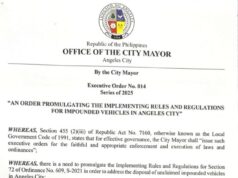Last week, the Clark Development Corp. (CDC) signed a lease agreement contract with Global Zoo and Theme Park Alliance Inc. (GZTPAI) President, Romeo Siccion that would pave the way for the establishment of a zoo in this freeport.
The CDC said the total leased land is 20 hectares and the project will employ about 140 workers in the next five years. The state-owned firm however has not given the exact location of the project.
Animal rights activists contend that what is labelled as a tourism-related project could very well be another venue to exploit animals.
According to the People for the Ethical Treatment of Animals (PETA) – Asia-Pacific, the zoos’ claim to educate people and preserve species usually fall short on both counts.
PETA said “animals’ normal behavior is seldom discussed, much less observed, because their natural needs are rarely met.”
It pointed out that “even the largest of zoo enclosures cannot compare to the vastness of an animal’s natural habitat and the signs on these enclosures provide little more information than an animal’s species, diet and natural range. The only thing zoos teach people is that it is acceptable to control every aspect of an animal’s life.”
But according to CDC’s Marketing Department, the zoo project with GZTPAI would include the provision of a haven for wildlife animals. A theme park but not limited to rides, adventure facilities and other recreational and commercial activities will also be put up, the CDC said.
CDC President-CEO Arthur P. Tugade said the soft opening of the project will be next year or within the next 12 months upon the issuance of the occupancy permit by the CDC along with other permits that must be complied by GZTPAI from other government and regulatory bodies involved in zoo operations.
Siccion reportedly has a private collection of tigers since 2007, including the rare Albino tiger, some imported species of birds, reptiles and other small animals which are in a mini zoo he established in the City of San Fernando.
He told Tugade that his vision is to create a place where love for animals could be advocated and shared to others and to educate Filipinos, particularly tourists, about wildlife conservation.
In its website, the PETA Asia-Pacific said “zoos present people with a distorted view of wildlife—we’re better off watching nature documentaries, reading about animals in books or on Web sites, or traveling to animals’ natural habitats.
In addition, zoos often push animals over the brink of sanity. Animals in zoos despair so much over their lack of space, privacy, physical exercise, and mental stimulation that they often resort to self-mutilation and other abnormal and self-destructive behaviors, displaying a mental condition that experts call zoochosis.”
As for conservation, PETA said “most animals kept in zoos are neither endangered nor being prepared for release into the wild. Species that are endangered rarely benefit from zoos’ breeding programs, because the babies often die in captivity.
Ultimately, we will only save endangered species by preserving their habitat and combating the reasons why they are killed by people in the first place.”
The CDC said Siccion is currently president of Zoo World Inc., a member of the Philippine Zoos Association (PhilZoos) and Southeast Asian Zoos and Aquariums (SEAZA).



